非谓语动词经典用法讲解与练习
- 格式:doc
- 大小:110.50 KB
- 文档页数:11
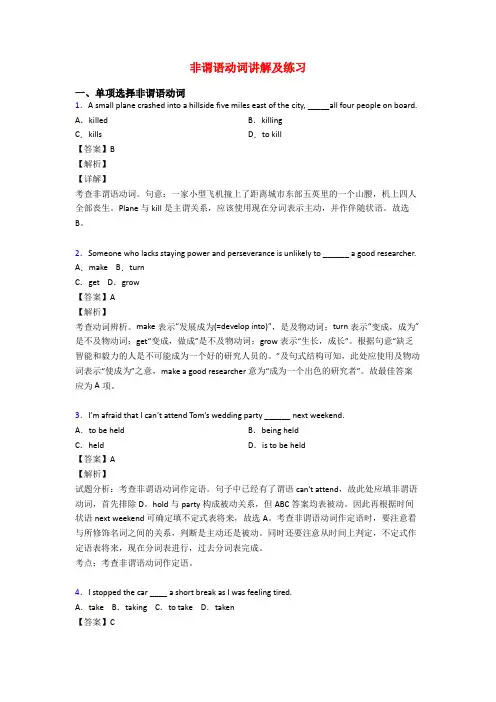
非谓语动词讲解及练习一、单项选择非谓语动词1.A small plane crashed into a hillside five miles east of the city, _____all four people on board. A.killed B.killingC.kills D.to kill【答案】B【解析】【详解】考查非谓语动词。
句意:一家小型飞机撞上了距离城市东部五英里的一个山腰,机上四人全部丧生。
Plane与kill是主谓关系,应该使用现在分词表示主动,并作伴随状语。
故选B。
2.Someone who lacks staying power and perseverance is unlikely to ______ a good researcher. A.make B.turnC.get D.grow【答案】A【解析】考查动词辨析。
make表示“发展成为(=develop into)”,是及物动词;turn表示“变成,成为”是不及物动词;get“变成,做成”是不及物动词;grow表示“生长,成长”。
根据句意“缺乏智能和毅力的人是不可能成为一个好的研究人员的。
”及句式结构可知,此处应使用及物动词表示“使成为”之意,make a good researcher 意为“成为一个出色的研究者”。
故最佳答案应为A项。
3.I’m afraid that I can’t attend Tom’s wedding party ______ next weekend.A.to be held B.being heldC.held D.is to be held【答案】A【解析】试题分析:考查非谓语动词作定语。
句子中已经有了谓语can't attend,故此处应填非谓语动词,首先排除D。
hold与party构成被动关系,但ABC答案均表被动。
因此再根据时间状语next weekend可确定填不定式表将来,故选A。
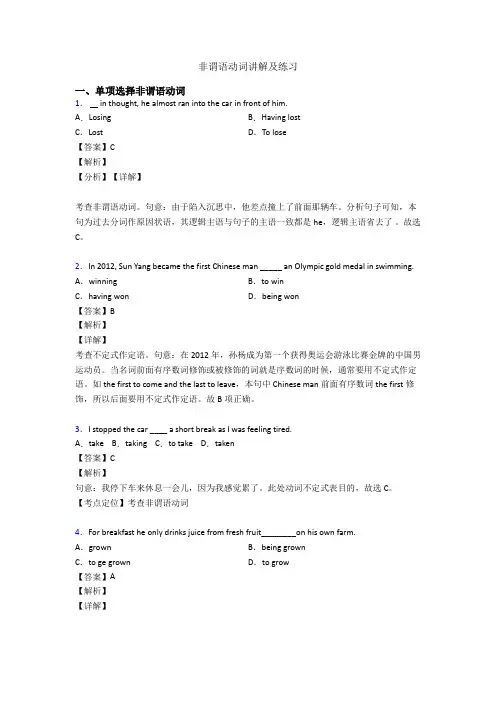
非谓语动词讲解及练习一、单项选择非谓语动词1. in thought, he almost ran into the car in front of him.A.Losing B.Having lostC.Lost D.To lose【答案】C【解析】【分析】【详解】考查非谓语动词。
句意:由于陷入沉思中,他差点撞上了前面那辆车。
分析句子可知,本句为过去分词作原因状语,其逻辑主语与句子的主语一致都是he,逻辑主语省去了。
故选C。
2.In 2012, Sun Yang became the first Chinese man _____ an Olympic gold medal in swimming. A.winning B.to winC.having won D.being won【答案】B【解析】【详解】考查不定式作定语。
句意:在2012年,孙杨成为第一个获得奥运会游泳比赛金牌的中国男运动员。
当名词前面有序数词修饰或被修饰的词就是序数词的时候,通常要用不定式作定语。
如the first to come and the last to leave,本句中Chinese man前面有序数词the first修饰,所以后面要用不定式作定语。
故B项正确。
3.I stopped the car ____ a short break as I was feeling tired.A.take B.taking C.to take D.taken【答案】C【解析】句意:我停下车来休息一会儿,因为我感觉累了。
此处动词不定式表目的,故选C。
【考点定位】考查非谓语动词4.For breakfast he only drinks juice from fresh fruit________on his own farm.A.grown B.being grownC.to ge grown D.to grow【答案】A【解析】【详解】考查非谓语动词作定语。
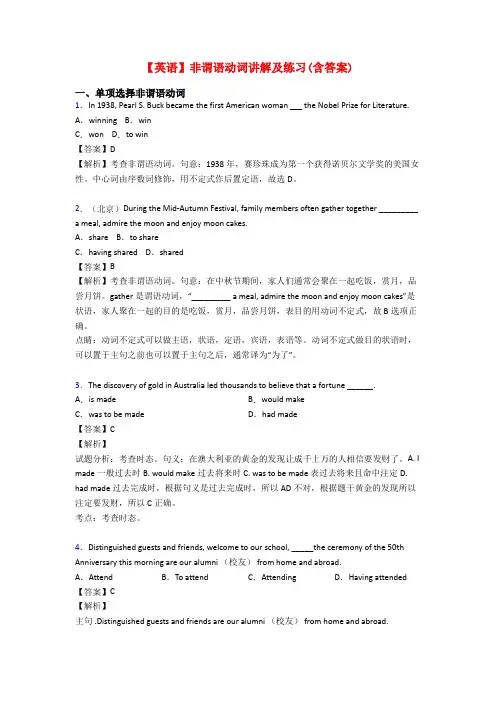
【英语】非谓语动词讲解及练习(含答案)一、单项选择非谓语动词1.In 1938, Pearl S. Buck became the first American woman the Nobel Prize for Literature. A.winning B.winC.won D.to win【答案】D【解析】考查非谓语动词。
句意:1938年,赛珍珠成为第一个获得诺贝尔文学奖的美国女性。
中心词由序数词修饰,用不定式作后置定语,故选D。
2.(北京)During the Mid-Autumn Festival, family members often gather together _________ a meal, admire the moon and enjoy moon cakes.A.share B.to shareC.having shared D.shared【答案】B【解析】考查非谓语动词。
句意:在中秋节期间,家人们通常会聚在一起吃饭,赏月,品尝月饼。
gather是谓语动词,“_________ a meal, admire the moon and enjoy moon cakes”是状语,家人聚在一起的目的是吃饭,赏月,品尝月饼,表目的用动词不定式,故B选项正确。
点睛:动词不定式可以做主语,状语,定语,宾语,表语等。
动词不定式做目的状语时,可以置于主句之前也可以置于主句之后,通常译为“为了”。
3.The discovery of gold in Australia led thousands to believe that a fortune ______.A.is made B.would makeC.was to be made D.had made【答案】C【解析】试题分析:考查时态。
句义:在澳大利亚的黄金的发现让成千上万的人相信要发财了。
A. I made 一般过去时B. would make过去将来时C. was to be made 表过去将来且命中注定D. had made 过去完成时,根据句义是过去完成时,所以AD不对,根据题干黄金的发现所以注定要发财,所以C正确。
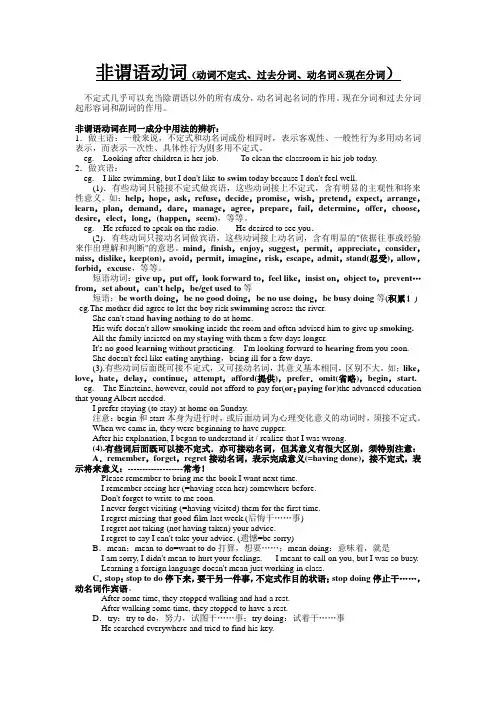
非谓语动词(动词不定式、过去分词、动名词&现在分词)不定式几乎可以充当除谓语以外的所有成分,动名词起名词的作用。
现在分词和过去分词起形容词和副词的作用。
非谓语动词在同一成分中用法的辨析:1.做主语:一般来说,不定式和动名词成份相同时,表示客观性、一般性行为多用动名词表示,而表示一次性、具体性行为则多用不定式。
eg.Looking after children is her job.To clean the classroom is his job today.2.做宾语:eg.I like swimming, but I don't like to swim today because I don't feel well.(1).有些动词只能接不定式做宾语,这些动词接上不定式,含有明显的主观性和将来性意义。
如:help,hope,ask,refuse,decide,promise,wish,pretend,expect,arrange,learn,plan,demand,dare,manage,agree,prepare,fail,determine,offer,choose,desire,elect,long,(happen,seem),等等。
eg.He refused to speak on the radio. He desired to see you.(2).有些动词只接动名词做宾语,这些动词接上动名词,含有明显的"依据往事或经验来作出理解和判断"的意思。
mind,finish,enjoy,suggest,permit,appreciate,consider,miss,dislike,keep(on),avoid,permit,imagine,risk,escape,admit,stand(忍受),allow,forbid,excuse,等等。
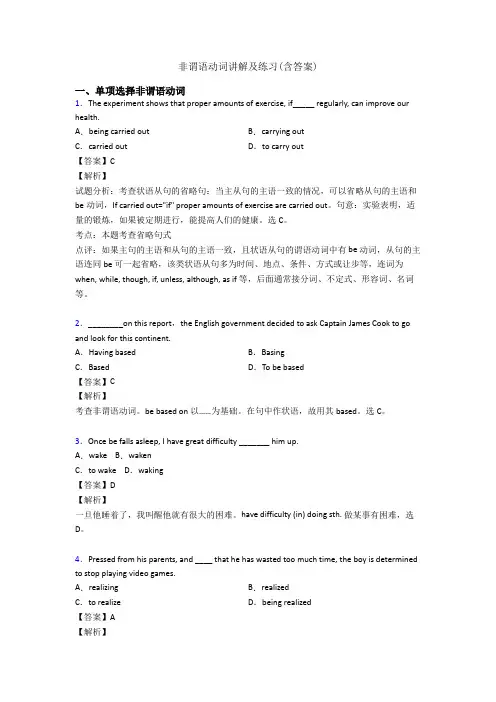
非谓语动词讲解及练习(含答案)一、单项选择非谓语动词1.The experiment shows that proper amounts of exercise, if_____ regularly, can improve our health.A.being carried out B.carrying outC.carried out D.to carry out【答案】C【解析】试题分析:考查状语从句的省略句:当主从句的主语一致的情况,可以省略从句的主语和be动词,If carried out="if" proper amounts of exercise are carried out。
句意:实验表明,适量的锻炼,如果被定期进行,能提高人们的健康。
选C。
考点:本题考查省略句式点评:如果主句的主语和从句的主语一致,且状语从句的谓语动词中有 be 动词,从句的主语连同be 可一起省略,该类状语从句多为时间、地点、条件、方式或让步等,连词为when, while, though, if, unless, although, as if 等,后面通常接分词、不定式、形容词、名词等。
2.________on this report,the English government decided to ask Captain James Cook to go and look for this continent.A.Having based B.BasingC.Based D.To be based【答案】C【解析】考查非谓语动词。
be based on以……为基础。
在句中作状语,故用其based。
选C。
3.Once be falls asleep, I have great difficulty _______ him up.A.wake B.wakenC.to wake D.waking【答案】D【解析】一旦他睡着了,我叫醒他就有很大的困难。
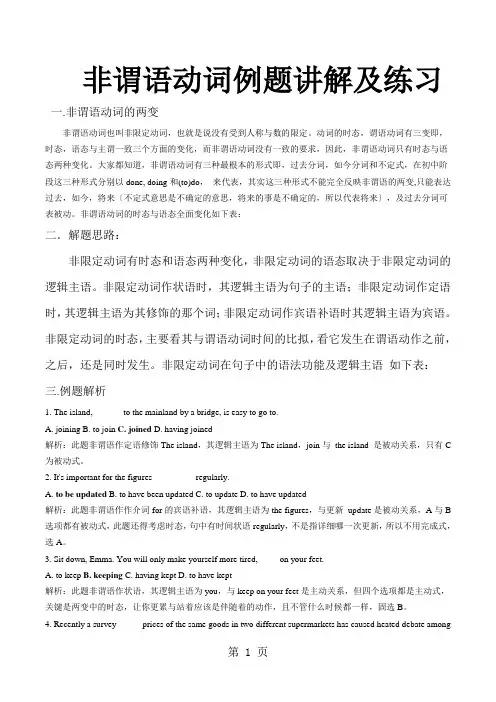
非谓语动词例题讲解及练习一.非谓语动词的两变非谓语动词也叫非限定动词,也就是说没有受到人称与数的限定。
动词的时态,谓语动词有三变即,时态,语态与主谓一致三个方面的变化,而非谓语动词没有一致的要求,因此,非谓语动词只有时态与语态两种变化。
大家都知道,非谓语动词有三种最根本的形式即,过去分词,如今分词和不定式,在初中阶段这三种形式分别以done, doing和(to)do,来代表,其实这三种形式不能完全反映非谓语的两变,只能表达过去,如今,将来〔不定式意思是不确定的意思,将来的事是不确定的,所以代表将来〕,及过去分词可表被动。
非谓语动词的时态与语态全面变化如下表:二.解题思路:非限定动词有时态和语态两种变化,非限定动词的语态取决于非限定动词的逻辑主语。
非限定动词作状语时,其逻辑主语为句子的主语;非限定动词作定语时,其逻辑主语为其修饰的那个词;非限定动词作宾语补语时其逻辑主语为宾语。
非限定动词的时态,主要看其与谓语动词时间的比拟,看它发生在谓语动作之前,之后,还是同时发生。
非限定动词在句子中的语法功能及逻辑主语如下表:三.例题解析1. The island, ______ to the mainland by a bridge, is easy to go to.A. joiningB. to joinC. joinedD. having joined解析:此题非谓语作定语修饰The island,其逻辑主语为The island,join与the island 是被动关系,只有C 为被动式。
2. It's important for the figures _________ regularly.A. to be updatedB. to have been updatedC. to updateD. to have updated解析:此题非谓语作作介词for的宾语补语,其逻辑主语为the figures,与更新update是被动关系,A与B 选项都有被动式,此题还得考虑时态,句中有时间状语regularly,不是指详细哪一次更新,所以不用完成式,选A。
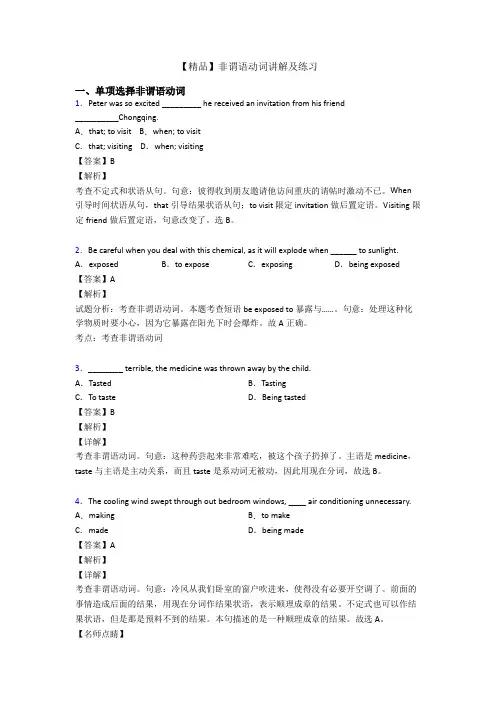
【精品】非谓语动词讲解及练习一、单项选择非谓语动词1.Peter was so excited _________ he received an invitation from his friend__________Chongqing.A.that; to visit B.when; to visitC.that; visiting D.when; visiting【答案】B【解析】考查不定式和状语从句。
句意:彼得收到朋友邀请他访问重庆的请帖时激动不已。
When 引导时间状语从句,that引导结果状语从句;to visit 限定invitation做后置定语。
Visiting限定friend做后置定语,句意改变了。
选B。
2.Be careful when you deal with this chemical, as it will explode when ______ to sunlight. A.exposed B.to expose C.exposing D.being exposed【答案】A【解析】试题分析:考查非谓语动词。
本题考查短语be exposed to暴露与……。
句意:处理这种化学物质时要小心,因为它暴露在阳光下时会爆炸。
故A正确。
考点:考查非谓语动词3.________ terrible, the medicine was thrown away by the child.A.Tasted B.TastingC.To taste D.Being tasted【答案】B【解析】【详解】考查非谓语动词。
句意:这种药尝起来非常难吃,被这个孩子扔掉了。
主语是medicine,taste与主语是主动关系,而且taste是系动词无被动,因此用现在分词,故选B。
4.The cooling wind swept through out bedroom windows, ____ air conditioning unnecessary. A.making B.to makeC.made D.being made【答案】A【解析】【详解】考查非谓语动词。
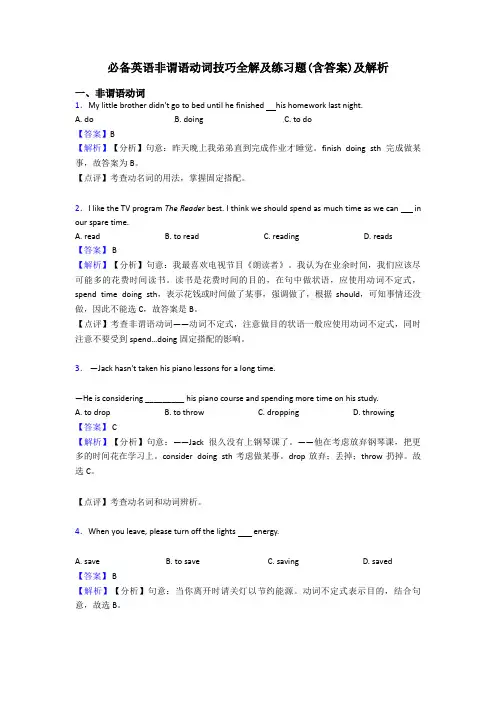
必备英语非谓语动词技巧全解及练习题(含答案)及解析一、非谓语动词1.My little brother didn't go to bed until he finished his homework last night.A. doB. doingC. to do【答案】B【解析】【分析】句意:昨天晚上我弟弟直到完成作业才睡觉。
finish doing sth完成做某事,故答案为B。
【点评】考查动名词的用法,掌握固定搭配。
2.I like the TV program The Reader best. I think we should spend as much time as we can in our spare time.A. readB. to readC. readingD. reads【答案】 B【解析】【分析】句意:我最喜欢电视节目《朗读者》。
我认为在业余时间,我们应该尽可能多的花费时间读书。
读书是花费时间的目的,在句中做状语,应使用动词不定式,spend time doing sth,表示花钱或时间做了某事,强调做了,根据should,可知事情还没做,因此不能选C,故答案是B。
【点评】考查非谓语动词——动词不定式,注意做目的状语一般应使用动词不定式,同时注意不要受到spend…doing固定搭配的影响。
3.—Jack hasn't taken his piano lessons for a long time.—He is considering _________ his piano course and spending more time on his study.A. to dropB. to throwC. droppingD. throwing【答案】 C【解析】【分析】句意:——Jack很久没有上钢琴课了。
——他在考虑放弃钢琴课,把更多的时间花在学习上。
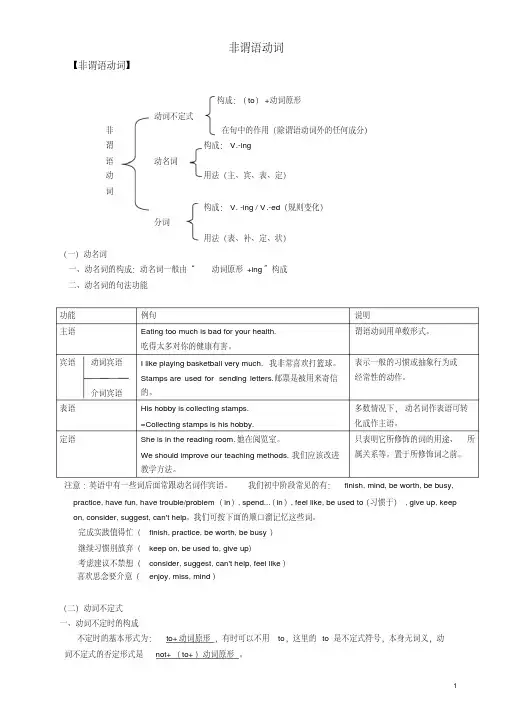
非谓语动词【非谓语动词】构成:(to)+动词原形动词不定式非在句中的作用(除谓语动词外的任何成分)谓构成:V.-ing语动名词动用法(主、宾、表、定)词构成:V. -ing / V.-ed(规则变化)分词用法(表、补、定、状)(一)动名词一、动名词的构成:动名词一般由“动词原形+ing”构成二、动名词的句法功能功能例句说明主语Eating too much is bad for your health.吃得太多对你的健康有害。
谓语动词用单数形式。
宾语动词宾语介词宾语I like playing basketball very much.我非常喜欢打篮球。
Stamps are used for sending letters.邮票是被用来寄信的。
表示一般的习惯或抽象行为或经常性的动作。
表语His hobby is collecting stamps.=Collecting stamps is his hobby. 多数情况下,动名词作表语可转化成作主语。
定语She is in the reading room.她在阅览室。
We should improve our teaching methods.我们应该改进教学方法。
只表明它所修饰的词的用途、所属关系等。
置于所修饰词之前。
注意:英语中有一些词后面常跟动名词作宾语。
我们初中阶段常见的有:finish, mind, be worth, be busy, practice, have fun, have trouble/problem(in), spend...(in), feel like, be used to(习惯于), give up, keep on, consider, suggest, can't help。
我们可按下面的顺口溜记忆这些词。
完成实践值得忙(finish, practice, be worth, be busy)继续习惯别放弃(keep on, be used to, give up)考虑建议不禁想(consider, suggest, can't help, feel like)喜欢思念要介意(enjoy, miss, mind)(二)动词不定式一、动词不定时的构成不定时的基本形式为:to+动词原形,有时可以不用to,这里的to 是不定式符号,本身无词义,动词不定式的否定形式是not+(to+)动词原形。
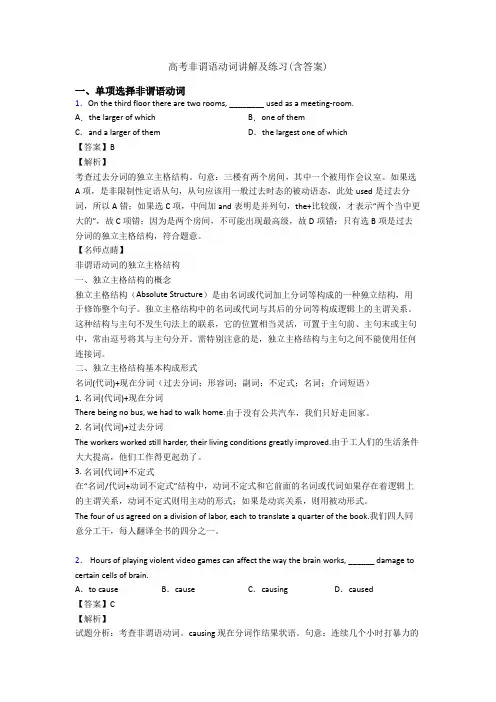
高考非谓语动词讲解及练习(含答案)一、单项选择非谓语动词1.On the third floor there are two rooms, ________ used as a meeting-room.A.the larger of which B.one of themC.and a larger of them D.the largest one of which【答案】B【解析】考查过去分词的独立主格结构。
句意:三楼有两个房间,其中一个被用作会议室。
如果选A项,是非限制性定语从句,从句应该用一般过去时态的被动语态,此处used是过去分词,所以A错;如果选C项,中间加and表明是并列句,the+比较级,才表示“两个当中更大的”,故C项错;因为是两个房间,不可能出现最高级,故D项错;只有选B项是过去分词的独立主格结构,符合题意。
【名师点睛】非谓语动词的独立主格结构一、独立主格结构的概念独立主格结构(Absolute Structure)是由名词或代词加上分词等构成的一种独立结构,用于修饰整个句子。
独立主格结构中的名词或代词与其后的分词等构成逻辑上的主谓关系。
这种结构与主句不发生句法上的联系,它的位置相当灵活,可置于主句前、主句末或主句中,常由逗号将其与主句分开。
需特别注意的是,独立主格结构与主句之间不能使用任何连接词。
二、独立主格结构基本构成形式名词(代词)+现在分词(过去分词;形容词;副词;不定式;名词;介词短语)1. 名词(代词)+现在分词There being no bus, we had to walk home.由于没有公共汽车,我们只好走回家。
2. 名词(代词)+过去分词The workers worked still harder, their living conditions greatly improved.由于工人们的生活条件大大提高,他们工作得更起劲了。
3. 名词(代词)+不定式在“名词/代词+动词不定式”结构中,动词不定式和它前面的名词或代词如果存在着逻辑上的主谓关系,动词不定式则用主动的形式;如果是动宾关系,则用被动形式。

高中英语语法非谓语动词讲解及其练习题The document was prepared on January 2, 2021高中英语语法非谓语动词讲解及其练习题非谓语动词是一个较难学的,今天我给大家总结一下非谓语动词的使用和练习,希望大家能把非谓语动词学会非谓语动词是在句子中充当除谓语以外的句子成分的动词形式是动词的非谓语形式.动词一般在句子中充当谓语.在句中可起名词,形容词,副词的作用,在句中充当主语,宾语,表语,补语,定语或状语.即动词的非谓语形式除了不能独立作谓语外,可以承担句子的任何成分3种形式:不定式,分词现在分词、过去分词,动名词1.非谓语动词与谓语动词的相同点有:1如果是及物动词都可与宾语连用,例如:They built a garden.They suggested building a garden.2都可以被状语修饰:The suit fits him very well.The suit used to fit him very well.3都有主动与被动, “体”式一般式;进行式;完成式的变化.例如:He was punished by his parents.谓语动词被动语态He avoided being punished by his parents.动名词的被动式We have written the composition.谓语动词的完成时Having written the composition, we handed it in.现在分词的完成式4都可以有逻辑主语They started the work at once.谓语动词的逻辑主语The boss ordered them to start the work.动词不定式的逻辑主语We are League members.谓语动词的主语We being League member, the work was well done.现在分词的逻辑主语2、非谓语动词与谓语动词的不同点有:1非谓语动词可以有名词作用如动词不定式和动名词,在句中做主语、宾语、表语.2非谓语动词可以有形容词作用如动词不定式和分词,在句中做定语、表语或宾语补足语.3非谓语动词可以有副词作用如动词不定式和分词,在句中作状语.4谓语动词在句中作谓语,受主语的人称和数的限制;非谓语动词在句中不能单独作谓语,它不受主语的人称和数的限制.二非谓语动词的句法功能:二、非谓语动词用法:一动词不定式:to+do,具有名词、形容词、副词的特征.1.不定式的形式:以动词write为例否定式:not + to do1一般式:不定式的一般式所表示的动作与谓语动词动作同时发生或发生在谓语动词动作之后,例如:I'm glad to meet you.He seems to know a lot.We plan to pay a visit.He wants to be an artist.The patient asked to be operated on at once.The teacher ordered the work to be done.2进行式:不定式的进行式所表示的动作与谓语动词动作同时发生,例如:The boy pretended to be working hard.He seems to be reading in his room.3完成式:不定式的完成式表示的动作发生在谓语动词动作之前,例如:I regretted to have told a lie.I happened to have seen the film.He is pleased to have met his friend.2.不定式的句法功能:1作主语:To finish the work in ten minutes is very hard.To lose your heart means failure.动词不定式短语作主语时,常用it作形式主语,真正的主语不定式置于句后,例如上面两句可用如下形式:It is very hard to finish the work in ten minutes.It means failure to lose your heart.常用句式有:1、It+be+名词+to do.2、It takes sb.+some time+to do.3、It+be+形容词+of sb +to do.4、It+be+形容词+for sb.+to do.常用careless,,clever,good,foolish,honest,kind,lazy,nice,right,silly,stupid,wise,等表示赞扬或批评的形容词,不定式前的sb.可作其逻辑主语.2作表语:Her job is to clean the hall.He appears to have caught a cold.3作宾语:常与不定式做宾语连用的动词有:want, hope, wish, offer, fail, plan, learn, pretend, refuse, manage, help, agree, promise, prefer, 如果不定式宾语后面有宾语补足语,则用it作形式宾语,真正的宾语不定式后置,放在宾语补足语后面,例如:Marx found it important to study the situation in Russia.动词不定式也可充当介词宾语,如:I have no choice but to stay here.He did nothing last Sunday but repair his bike.动词不定式前有时可与疑问词连用,如:He gave us some advice on how to learn English.4作宾语补足语:在复合宾语中,动词不定式可充当宾语补足语,如下动词常跟这种复合宾语:want, wish, ask, tell, order, beg, permit, help, advise, persuade, allow, prepare, cause, force, call on, wait for, invite.此外,介词有时也与这种复合宾语连用,如:With a lot of work to do, he didn't go to the cinema.有些动词如make, let, see, watch, hear, feel, have等与不带有to的不定式连用,但改为被动语态时,不定式要加to, 如:I saw him cross the road.He was seen to cross the road.5作定语:动词不定式作定语,放在所修饰的名词或代词后.与所修饰名词有如下关系:①动宾关系:I have a meeting to attend.注意:不定式为不及物动词时,所修饰的名词如果是地点、工具等,应有必要的介词,如:He found a good house to live in.The child has nothing to worry about.What did you open it with如果不定式修饰time, place, way,可以省略介词:He has no place to live.This is the best way to work out this problem.如果不定式所修饰名词是不定式动作承受者,不定式可用主动式也可用被动式:Have you got anything to sendHave you got anything to be sent②说明所修饰名词的内容:We have made a plan to finish the work.③被修饰名词是不定式逻辑主语:He is the first to get here.6作状语:①表目的:He worked day and night to get the money.She sold her hair to buy the watch chain.注意不定式放句首时,逻辑主语与句子主语要一致:wrong:To save money, every means has been tried. right:To save money, he has tried every means. wrong:To learn English well, a dictionary is needed. right:To learn English well, he needs a dictionary.②表结果:He arrived late to find the train gone.常用only放在不定式前表示强调:I visited him only to find him out.③表原因:They were very sad to hear the news.④表程度:It's too dark for us to see anything.The question is simple for him to answer.7作独立成分:To tell you the truth, I don't like the way he talked.8不定式的省略:保留to省略do动词.If you don't want to do it, you don't need to.9不定式的并列:第二个不定式可省略to.He wished to study medicine and become a doctor.二动名词:动名词既具有动词的一些特征,又具有名词的句法功能.1.动名词的形式:否定式:not + 动名词1一般式:Seeing is believing. 眼见为实.2被动式:He came to the party without being invited.他未被邀请就来到了晚会. 3完成式:We remembered having seen the film. 我们记得看过这部电影.4完成被动式:He forgot having been taken to Guangzhou when he was five years old. 他忘记五岁时曾被带到广州去过.5否定式:not + 动名词I regret not following his advice. 我后悔没听他的劝告.6复合结构:物主代词或名词所有格+ 动名词He suggested our trying it once again. 他建议我们再试一次.His not knowing English troubled him a lot.他不懂英语给他带来许多麻烦.2.动名词的句法功能:1作主语:Reading aloud is very helpful. 朗读是很有好处的.Collecting stamps is interesting. 集邮很有趣.当动名词短语作主语时常用it作形式主语.It's no use quarrelling.争吵是没用的.2作表语:In the ant city, the queen's job is laying eggs.在蚂蚁王国,蚁后的工作是产卵.3作宾语:They haven't finished building the dam. 他们还没有建好大坝.We have to prevent the air from being polluted.我们必须阻止空气被污染.注意动名词既可作动词宾语也可作介词宾语,如上面两个例句.此外,动名词作宾语时,若跟有宾语补足语,则常用形式宾语it,例如:We found it no good making fun of others. 我们发现取笑他人不好.要记住如下动词及短语只跟动名词作宾语:enjoy, finish, suggest, avoid避免, excuse ,delay, imagine, keep, miss, consider, admit承认,deny否认, mind, permit, forbid, practise, risk冒险, appreciate感激, be busy, be worth, feel like, can't stand, can't help情不自禁地, think of, dream of, be fond of, prevent…from,keep …from, stop…from,protect…from, set about, be engaged in, spend…in, succeed in, be used to, look forward to, object to, pay attention to, insist on, feel like4作定语:He can't walk without a walking-stick. 他没有拐杖不能走路.Is there a swimming pool in your school 你们学校有游泳池吗5作同位语:The cave, his hiding-place is secret. 那个山洞,他藏身的地方很秘密.His habit, listening to the news on the radio remains unchanged.他收听收音机新闻节目的习惯仍未改变.三现在分词:现在分词既具有动词的一些特征,又具有形容词和副词的句法功能.1、现在分词的形式:否定式:not + 现在分词1现在分词的主动语态:现在分词主动语态的一般式表示与谓语动词所表示的动作同时发生,完成式表示的动作在谓语动词所表示的动作之前发生,常作状语.例如:They went to the park, singing and talking. 他们边唱边说向公园走去.Having done his homework, he played basket-ball. 做完作业,他开始打篮球.2现在分词的被动语态:一般式表示与谓语动词同时发生的被动的动作,完成式表示发生在谓语动词之前的被动的动作.The problem being discussed is very important. 正在被讨论的问题很重要.Having been told many times, the naughty boy made the same mistake.被告诉了好几遍,这个淘气的孩子又犯了同一个错误.2.现在分词的句法功能:1作定语:现在分词作定语,当分词单独做定语时,放在所修饰的名词前;如果是分词短语做定语放在名词后.In the following years he worked even harder.在后来的几年中,他学习更努力了.The man speaking to the teacher is our monitor's father.正与老师谈话的那个人是我们班长的父亲.现在分词作定语相当于一个定语从句的句法功能,如:in the following years 也可用in the years that followed; the man speaking to the teacher可改为the man who is speaking to the teacher.2现在分词作表语:The film being shown in the cinema is exciting. 正在这家上演的电影很棒.The present situation is inspiring. 当前的形势鼓舞人心.be + doing既可能表示现在进行时,也可能是现在分词做表语,它们的区别在于be + doing表示进行的动作是进行时,而表示特征时是系动词be与现在分词构成系表结构.3作宾语补足语:如下动词后可跟现在分词作宾语补足语:see, watch, hear, feel, find, get, keep, notice, observe, listen to, look at, leave, catch等.例如:Can you hear her singing the song in the next room 你能听见她在隔壁唱歌吗He kept the car waiting at the gate. 他让小汽车在门口等着.4现在分词作状语:①作时间状语:While Working in the factory, he was an advanced worker.在工厂工作时,他是一名先进工人.②作原因状语:Being a League member, he is always helping others. 由于是共青团员,他经常帮助他人.③作方式状语,表示伴随:He stayed at home, cleaning and washing. 他呆在家里,又擦又洗.④作条件状语:If Playing all day, you will waste your valuable time.要是整天玩,你就会浪费宝贵的时间.⑤作结果状语:He dropped the glass, breaking it into pieces. 他把杯子掉了,结果摔得粉碎.⑥作目的状语:He went swimming the other day. 几天前他去游泳了.⑦作让步状语:Though raining heavily, it cleared up very soon.虽然雨下得很大,但不久天就晴了.⑧与逻辑主语构成独立主格:I waiting for the bus, a bird fell on my head.我等汽车时,一只鸟落到我头上.All the tickets having been sold out, they went away disappointedly.所有的票已经卖光了,他们失望地离开了.Time permitting, we'll do another two exercises.如果时间允许,我们将做另两个练习.有时也可用with without +名词代词宾格+分词形式With the lights burning, he fell asleep. 他点着灯睡着了.⑨作独立成分:udging fromby his appearance, he must be an actor.从外表看,他一定是个演员.Generally speaking, girls are more careful. 一般说来,女孩子更细心.四过去分词:过去分词只有一种形式:规则动词由动词原形加词尾-ed构成.不规则动词的过去分词没有统一的规则要求,要一一记住.过去分词的句法功能:1.过去分词作定语:Our class went on an organized trip last Monday. 上周一我们班开展了一次有组织的旅行.Those elected as committee members will attend the meeting. 当选为委员的人将出席这次会.注意当过去分词是单词时,一般用于名词前,如果是过去分词短语,就放在名词的后面.过去分词做定语相当于一个被动语态的定语从句.2.过去分词作表语:The window is broken. 窗户破了.They were frightened at the sad sight. 他们对眼前悲惨的景象感到很害怕.注意:be + 过去分词,如果表示状态是系表结构,如果表示被动的动作是被动语态.区别:The window is broken.系表The window was broken by the boy.被动有些过去分词是不及物动词构成的,不表示被动,只表示完成.如:boiled water开水 fallen leaves落叶newly arrived goods新到的货 the risen sun升起的太阳the changed world变了的世界这类过去分词有:gone, come, fallen, risen, changed, arrived, returned, passed 等.3.过去分词作宾语补足语:I heard the song sung several times last week.上周我听见这首歌被唱了好几次.有时过去分词做with短语中的宾语补足语:With the work done, they went out to play. 工作做完了,他们出去玩去了.4.过去分词作状语:Praised by the neighbours, he became the pride of his parents.受到邻居们的表扬,他成为父母的骄傲.表示原因Once seen, it can never be forgotten.一旦它被看见,人们就忘不了.表示时间Given more time, I'll be able to do it better.如果给予更多的时间,我能做得更好.表示条件Though told of the danger, he still risked his life to save the boy.虽然被告之有危险,他仍然冒生命危险去救那个孩子.表示让步Filled with hopes and fears, he entered the cave. 心中充满了希望与恐惧,他走进山洞.非谓语动词考点分析1.The Olympic Games, ______ in 776 ,did’t include women players until 1919.playing be first played played be first playing析:根据题干,必须选表示被动的选项,故排除A、D;因B选项表“将要被举行”意,不合题干之用,只有C选项相当于which was first played才合用.2.European football is played in 80 countries, ______ it the most popular sportin the world.make析:B、C是谓语动词,在此不可用.D项to make或表目的,或表“将要使得”,这都不合题干情景.只有,可作状语,表结果.再举一现在分词作结果状语例:The bus was held up by the snowstorm,causing the delay.公共汽车被大风雪所阻,因而耽误了.3.Little Jim should love ______ to the theatre this evening.be taken take taken析:根据this evening,应选表示将来义的选项,C、D应排除.Take后无宾语,必然要用被动式,故答案为A.4.John was made ______ the truck for a week as a punishment.wash be washing析:根据be made to do sth.句式,可定答案为A.5.The patient was warned ______ oily food after the operation.eat not not to eat eating析:根据warn sb.notto do sth.句式,可排除B、D两项;又根据非谓语动词的否定式not总是在首位的规律,又可排除A,而定C.6.——I usually go there by train. ——Why not ______ by boat for a change try going to go try and go going析:此题可根据why not后直接跟原形动词规律而一举确定正确答案为D.若将B项改为try to go,则要根据其与try going意义之别来确定答案.依据题干对话内容,乙方是建议甲方尝试乘船变变花样,所以答案仍为D.7.______ a reply,he decided to write again.receiving not having received not received析:非谓语动词的否定式not应置于首位,B、D皆为错误形式.A项不能表达先于decided的动作,只有选C项才表没收到信在先,决定再写信在后,所以C为正确答案.8.Charles Babbage is generally considered ______ the first computer.invent have invented mvented析:consider表“考虑”意时,其后动词用doing形式,此处不表“考虑”,而表“认为”,这时consider后作宾语补足语或主语补足语多为to do,to have done,to be等形式.据此可排除B、D两个选项.又因A表“要发明”意,不合题用,只有C表“发明了”意,才合题用,故选C.9.Most of the artists ______ to the party were from South Africa.invite invited been invited析:“被邀请参加晚会”,应选表被动意的选项,B不可用.D项少引导词who,也应排除.又因短暂动词的现在分词被动式不可作定语,C也应排除,只有=who were invited才是正确答案.10.The murderer was brought in,with his hands ______ behind his back.tied tied be tired析:B表主动意,应排除.C表“将要被捆绑”,A表“正在被捆绑”都不合题意,只有D项填入空白才能表达“双手被反绑着”这一意思,符合题干情景.再看一类似例句: He came in,withhis head held high.他昂首走了进来.非谓语动词专练more attention,the trees could have grown better.give givenfirst textbooks ______ for teaching English as a foreign language came out in the 16th century.be written written writtenmissing boys were last seen ______ near the river.play be playingin thought,he almost ran into the car in front of him.lose lostpassing me he pretended ______ me.see having seen have not seen to have seenchildren insisted ______ there on foot.going would go their goingstill remembers ______ to Shanghai when he was very young.taken takenthe railway station,we had a break,only ______ the train had left.at;to find to;discovering thatarriving at;finding out to;to have found outthe boy ______ the way,we had no trouble ______ the way ______ to Zhongshan Park.;finding;leading lead;found;to lead ;finding;led ;found;ledthese pictures,I couldn’t help thinking of those days when I was in Being and______ from the top of a thirty-storeyed building,Beijing looks more beautiful.;seen ;seeing ;seeing ;seencan hardly imagine Peter ______ across the Atlantic Ocean in five days.have sailed sailyou wave your book in front of your face,you can feel the air ______ against your face.moveis known to all,China will be an ______ and powerful country in 20 or 30 years’ time.;advancing ;advanced ;advanced ;advancingshopping,people sometimes can’t help ______ into buying something they don’t really need.persuaded persuadedwas terrible noise ______ the sudden burst of light.be followed followedexcuse my ______ in without ______ .;permitted ;permitted ;being permitted come;being permittedhis head high,the manager walked into the room to attend the meeting ______ then.;being held ;holding held;held ;to be held18.——Did you hear her ______ this pop song this time the other day——Yes,and I heard this song ______ in English.;singing ;sung ;singing ;sungquestion ______ now at the meeting is not the question ______ yesterday.;discussed ;had discussed discussed;discussed ;discussingthe cooking ______ ,I went on ______ some sewing.;to do done;doing be done;doing have done;doingis no use ______ your past mistakes.A. regrettingB. regretC. to regretD. regrettedhusband died in 1980 and had nothing ______ to her,only ______ her five children.;to leave ;leaving ;left ;leavingam very have a very difficult problem ______ .work work out be worked out work it outwould appreciate ______ back this affernoon.to call call calling ’re callingmountains was ______ ,so we all felt ______ .;tired ;tiring ;tiring ;tiredsaw some villagers ______ on the bench at the end of the room.themselveswas glad to see her child well ______ care of.be takenis one of the important problems ______ tomorrow.solve be solvedmaps properly,you need a special pen.draw drawingis a river ______ around our school.run be runningabout the two of us ______ a walk down the gardentake be takenwas fortunate to pick up a wallet ______ on the ground on the way back home, but unfortunately for me,I found my colour TV set. ______ when I got home.;stolen ;stealing ;stolen ;stealingthe kind-hearted boy ____ me with my work,I’m sure I’ll be able to spare time___ with your work.help;help you out ;helping you ;to help you out help;to help youmovedd by her words, ______ .came to his eyes B .he could hardly hold back his tearsC. tears could hardly be held backD. his eyes were filled with tears.35.——I hope the children won’t touch the dog.——I’ve warned them ______ .to touch dowould love ______ to the party last night but I had to work extra hours to finish a report.go have gone gone______ why he walked in without permission,he just stared at us and said nothing.asked be askedman kept silent in the room unless ______ .to to speakwas often listened ______ in the next room.sing to singthan ______ on a crowded bus,he always prefers ______ a bicycle.;ride ;ride ;to ride ride;ridingboy wanted to ride his bicycle in the street,but his mother told him ______ .to to do do it not to’s troubling them is ______ enough experienced workers.they have to have not not having their havinghis telephone number,she had some difficulty getting in touch with Bill.knowing not having known not knowis used ______ houses in some places .build building be built builton ______ the other exercise after you have finished this one.do be doingday we looked forward to ______ .come comewould you rather ______ the workhave to do have do to do doyou think it any good ______ with him againtalk talking talkednew ideas have to be tested many times before ______ .fully fully accepted accepting being acceptedgovernment forbids ______ such bad books.publish非谓语动词专练答案1―5 C B D B D 6―10 C B A A A 11―15 C B C C B 16―20 C A D C A21―25 A D B C A 26―30 C C B C C 31―35 C A D B B 36―40 B B A D C 41―45 A C A A A 46―50 C D A B D非谓语动词非谓语动词是指分词包括现在分词和过去分词、不定式、动名词等三种形式,即:doing , done , to do , doing .当然它们有各自不同的变化形式,如:现在分词 doing : 有being done被动式 ; having done 完成式; having been do ne 完成被动式不定式 to do : 有to be done 被动式; to have done 完成式; to be doing进行式动名词 doing : 有having done完成式; being done被动式 ;非谓语动词的特点:三种非谓语动词都具有动词的特征,虽然它们没有人称和数的变化,但是它们都能带自己的状语或有时跟宾语.它们都有各自的特征:分词具有形容词和副词的特征;动名词具有名词的特征;不定式具有名词、形容词和副词的特征.具体来讲:分词在句子中可以做定语、表语、状语或补足语等;动名词在句子中可以做主语、宾语、表语等;不定式在句子中可以做主语、宾语、表语、补足语或状语.下面分别对三种非谓语动词进行讲解:一.动词不定式先看几个例句,判断不定式在句中的成分.1.To learn a foreign language is difficult .2. His wish is to be a driver .3.Tom wanted to have a cup of beer .4.The teacher told us to do morning exercises .5.I have nothing to say .6.They went to see their aunt .7.It’s easy to see their aunt.8.I don’t know what to do next .9.I heard them make a noise .说明:1.动词不定式作主语, 2.动词不定式作表语,3.动词不定式作宾语,4.动词不定式作宾语补足语,5.动词不定式作定语,6.动词不定式作目的状语,7.动词不定式作真正主语,it 代替动词不定式,作形式主语.8.带有连接代词的动词不定式作宾语,9.不带to 的动词不定式作宾语补足语.掌握动词不定式应注意的几个问题:1.“to” 是不定式符号还是介词,下列短语中的to 都是介词.agree to object to close to , come to , lead to , refer to ,equal to , familiar to , point to , thank to , devote to , next to , belong to , be used to , look forward to2.带to 还是不带toI have no choice but to give inI cannot do anything but give inI saw him enter the classroom .但是: He was seen to enter the classroom .3.动词不定式逻辑主语是由for 作为标记的.但是有时用of .It’s necessary for you to study hard .It’s foolish of him to do it .与of 连用的形容词有:good, kind , nice , wise ,clever , foolish , right , wrong , careful , careless , polite , possible4.后接不定式作宾语的动词有:want , hope , wish , like , begin , try , need , forget , agree , know , promise , teach , refuse , help , arrange , dare , decide , determine , fail , manage , offer , prepare , continue , ask , mean , choose , expect etc.需要宾语补足语的动词不能用动词不定式直接做介词的宾语,而要用it做形式宾语.例如:通常不说We think to obey the laws is important . 而说We think it important to obey the laws .5.不定式的省略.下列短语中,如果意义明确,常常省略到to .want to , wish to ,hope to , like to , hate to , plan to , try to , love to , have to , o ught to , need to , used to , be able to6.不定式作定语,应注意两种关系:1动宾关系:He has a lot of meeting to attend .Please lend me something to write with .He is looking for a room to liveHe is looking for a room to live in .He has no money and no placeto live in .I think the best way to travel by is on foot .There is no time to think about .2主谓关系:She is always the last person to speak at the meeting .----I’m going to the post office , for I have a l etter to post . 逻辑主语是I-------Thank you. But I have no letters to be posted now 逻辑主语不是I7.不定式作状语,可以有以下几种意义:1 原因He is lucky to get here on time .这种结构中常用的形容词有:happy , glad , delighted , pleased , sorry , eager , anxious . lucky , fortunate , proud , angry surprised , frightened , disappointed , ready , clever , foolish , worthy2 目的He came to help me with my maths .3 结果I hurried to get there only to find him out .The book is too hard for the boy to read .He is old enough to go to school .8 . 不定式作补足语I saw him play in the street just now .能跟不带to 的不定式作补足语的动词有:see , feel , hear , listen to , look at , watch , let , have make, observe, notice 注: 当这些词为被动式时,不定式要带to , 如:He was seen to play in the street just now.二.动名词Learning English is very difficult .学英语非常困难.His job is driving a bus .他的工作是开车.I enjoy dancing .我喜欢跳舞.I have got used to living in the country .我已经习惯了住农村.Take some sleeping tablets , and you will soon fall asleep .吃点安眠药,你很快就会入睡.注意以下几种结构:1.There’s no telling what will happen .=It’s impossible to tell what will happen .= No one can tell what will happen .2.It’s no use talking with him .It’s no good speaking to them like that .3.There’s some difficulty in doing …在此句型中,difficulty 可以由以下单词替换:trouble , problem , fun , pleasure , a good time , a hard time 注意以下几个问题:1.下列动词后跟不定式与跟动名词作宾语意义有区别, forget to do … 忘记要做某事forget doing… 忘记做了某事remember to do…记住要做某事remember doing …记着做了某事mean to do … 有意要做某事mean doing … 意味着做了某事regret to do … 对要做的事表示后悔regret doing … 对做过去的事后悔can’t help to do…不能帮助做某事can’t help doing … 情不自禁做某事try to do … 尽力去做某事try doing 试着做某事learn to do … 学着去做某事learn doing … 学会做某事stop to do … 停下来去做另一件事stop doing … 停止做某事go on to do … 接着做另外一件事go on doing … 继续做某事used to do … 过去做某事be used to doing … 习惯做某事2.动名词作定语与现在分词作定语意义有区别动名词作定语表达 n+ for doing 的含义现在分词作定语表达 n+whichwho be doing的含义如:a sleeping car = a car for sleepinga running horse = a horse which is running前者是动名词 , 后者是现在分词又如: drinking water , walking stick running water , sleeping boy3.动名词的逻辑主语:动名词的逻辑主语为代词或名词的所有格形式.例如:His coming made us very happy .4.动名词的语态和时态5.动名词主动形式表被动的情况:need doing , want doing , require doing例如: This room needs painting . 这个房间需要粉刷.6.只能跟动名词作宾语的动词:admit , avoid , advise , consider , delay , deny , enjoy , escape , excuse , fancy , finish , complete , forbid , imagine , mind , miss , permit . practise , require , suggest ,risk , keep, take to , look forward to , get down to , feel like , can’t help , can’t stand , be used to ,insist on , succeed in , set about, give up , include ,三.分词1 The story is interesting . I’m interested in it .这个故事有兴趣,我对这个故事感兴趣.2 . This is a moving film .这是一部动人的电影.3. The secretary worked late into the night , preparing a long speech for the president .秘书工作到深夜,为主席准备一篇长篇演讲稿.4. Given more tim e , I’ll do it well .如果给我多一点时间,我会做的更好.When he passed the back of the street , he saw the thief stealing some money from the bank .当他后街时,看到小偷正从银行偷钱.应注意的几个问题:1.现在分词与过去分词的区别Do you know the woman talking to Tom= Do you know the woman who is talking to TomThe soldier wounded in the war has become a doctor.= The soldier who was wounded in the war has become a doctor.China is a developing country and America is a developed country.2.分词作表语The news sounds encouraging .They got very excited .1现在分词与过去分词作表语的区别:The news is interesting .He is interested in the news .doing 作表语,主语与表语是主谓关系;done 作表语,主语与表语是动宾关系.2表语与被动式的区别:The blackboard was broken by Xiao Ming .强调动作。
非谓语动词讲解非谓语动词: a.动词不定式 b. v-ing c. 过去分词概述:1.谓语动词:在句子中担任谓语的动词2.非谓语动词:是动词的特殊形式,在句中可以作除谓语外的所有成分非谓语动词使用条件一个句子当中,已经存在一个主句(谓语动词),又没有连词的情况下, 还有别的动词出现时。
She got off the bus, leaving her handbag on her seat.She got off the bus, but left her handbag on her seat.动词不定式一.动词不定式的时态和被动形式动词不定式是非谓语动词的一种,由不定式符号(to)加动词原形构成。
不定式的形式有五种:1.一般式to do I like to read English.2.进行式to be doing He seemed to be reading something at that time.3.完成式to have done He seemed to have cleaned the room.4.被动式to be done The work is to be done soon.5.完成被动式to have been doneThe boy is said to have been sent to hospital yesterday.疑问词+动词不定式What, who, which, where, when, how, why等疑问词构成不定式短语,这种短语在句子中可作主语、宾语和表语等成分。
二. 动词不定式的用法I.作主语(1)不定式做主语时,可以直接放在谓语动词之前。
To see is to believe.Not to get there in time is your fault.(2)注:常用it做形式主语,将to do位于之后,使句子保持平衡。
句型1:It + 谓语+(+sb.)+时间/金钱+ to doIt takes us an hour _to__ get there by bus.It costs you only $ 100 a month to cook at home.It seemed impossible to save money.句型2:It’s + n. (+ for sb) + to doIt’s our duty _to_ help the poor.It is a great enjoyment _to_ spend our holiday in the countryside..It is a great honor for us to be present at your birthday party.句型3:It is + adj (+ for sb)to do sth(是形容事物的性质的)It is + adj (+ of sb)to do sth(是形容人的品质的)It is easy for me to finish this work before ten.It is very kind of you to give me some help.It's impolite of you to speak to the teacher like that.疑问词+不定式作主语When to start remains undecided.1.It is easy to get there by bus or taxi.2. It takes about 3 hours to see all the birds.3. It is also impolite to speak with your mouth full when you are eating.4. It’s our duty to take good care of the old.5. How long did it take you to finish the work?6. It is stupid of you to write down everything the teacher says.7. When to start has not been decided.8. It seemed selfish of him not to give them anything.9. It’s necessary for you to lock the car when you do not use it.10. It is useful for our health to do morning exercises.II.作宾语接不定式做宾语I want to know this matter.I don’t expect to meet you here(1)常见动词有:like, demand, expect, promise, begin, determine, refuse, fail, manage, learn, seem, forget, want, prepare, pretend, plan, wish等They want to get_( get ) on the bus, didn’t they?He said he wished __to be ( be ) a professor.(2)it作形式宾语I find/feel to work with him interesting .I find/feel it interesting to work with him.Subject+ find/think/feel/make/ consider… it+adj/n + to do sth.1.We thought_it__better__to_start early.2.Do you consider_it__better not_to_go?3.I feel_it_my duty_to_change all that.4.We think it __ important _ to _ obey the law.5.I know _ it _ impossible _ to _ finish so much homework in a day. (3)疑问词+不定式作宾语常常放在这些动词的后面作宾语:tell, advise, show, teach, find out, decide, discuss, learn, explain…He taught us how to use the tool.No one could tell me where to get the book.The dictionary didn’t tell the Frenchman how to pronounce the word.(4) 作介词but, except, besides的宾语。
非谓语动词讲解及练习(含答案)一、单项选择非谓语动词1.______ the pictures on the screen more clearly, they moved to the front row.A.To watch B.WatchingC.Watched D.Having watched【答案】A【解析】考查非谓语动词。
句意:为了更清楚的看屏幕上的图片,他们移到了前排。
表示目的用不定式,故选A。
2.In Australia, many road signs are now both in English and Chinese, ______ it easier for Chinese tourists to travel.A.making B.made C.make D.makes【答案】A【解析】考查状语从句。
在澳大利亚,许多路标都是用英文和中文同时标识,使中国游客去旅游更加容易。
根据与前面一句用逗号隔开,没有连词,故判断此空用非谓语动词,根据与主语是主动关系,故用动词-ing形式,用来修饰和补充上一句话,故选A。
3.(天津) The hospital has recently obtained new medical equipment, ________ more patients to be treated.A.being allowed B.allowingC.having allowed D.allowed【答案】B【解析】【详解】考查非谓语动词。
句意:近期这个医院购进了新的医疗设备,允许更多的病人被治疗。
前句购进医疗设备和后面允许更多的病人被治疗之间是必然的结果关系,用doing即现在分词作结果状语,表示顺理成章的结果。
A. being allowed表示被动且正在进行;C. having allowed 强调先于谓语动词发生;D. allowed表示被动且完成,故选B。
【英语】非谓语动词解说及练习(含答案)一、单项选择非谓语动词1.The film star wears sunglasses. Therefore, he can go shopping without ___________. A.recognizing B.being recognizedC. having recognized D. having been recognized【答案】 B【分析】试题剖析:本题考察动词的非谓语动词形式。
句意:那位电影明星戴上墨镜。
所以,他去买东西不会被认出来。
依据题中的介词without判断,今后应当使用动词的动名词形式,因为他是被人认出的,所以应当用动名词的被动式,所以选B。
考点:考察非谓语动词的用法2.(天津 ) The hospital has recently obtained new medical equipment, ________ more patients to be treated.A. being allowed B.allowingC. having allowed D. allowed【答案】 B【分析】【详解】考察非谓语动词。
句意:近期这个医院购进了新的医疗设施,同意更多的病人被治疗。
前句购进医疗设施和后边同意更多的病人被治疗之间是必定的结果关系,用doing 即此刻分词作结果状语,表示理所应当的结果。
A. being allowed 表示被动且正在进行; C. having allowed 重申先于谓语动词发生; D. allowed 表示被动且达成,应选B。
【点睛】判断非谓语动词的形式的第一步是剖析句子成分,看是用谓语动词仍是非谓语动词,确立了是非谓语动词,还要判断非谓语动词的成分,和这个动词和逻辑主语的关系。
3.________ by the advances in technology, many farmers have set up wind farms on their land. A. Being encouraged B.EncouragingC. Encouraged D. Having encouraged【答案】 C【分析】试题剖析:考察过去分词做状语:句意:被科技的进步激励着,好多农民在自己的土地上建起了风力发电厂。
非谓语动词解说及练习( 含答案 )一、单项选择非谓语动词1.New York is the fashion capital of the world, says a new study on Feb 4. 2014 by the Global Language Monitor (GLM), Pairs ____ second, with Shanghai ______10 th while Hongkong 20 th. A. coming, ranks B. come, ranked C.comes, ranking D.coming, ranking【答案】 D【分析】 D 考察非谓语动词。
句意: 2 月 4 日的一项新研究表示,纽约是世界的时髦之都。
2014 年全世界语言监测机构 (GLM)排名第二,上海排名第10,香港排名第20。
Come 和Pair 是主动关系用动词 ing 形式, rank 与 Shanghai 是主动关系,用动词 ing形式,应选 D。
2.China ’ s Chang ’ e 4 robotic probe entered lunar orbit on Wednesday, ________ a major step in its mission to make a soft landing on the moon’ s far side.A. marking C. having marked B.to mark D. marked【答案】 A【分析】【详解】考察非谓语动词。
句意:周三,中国的嫦娥 4 号机器人探测器进入月球轨道,标记着它在月球远端软着陆任务中迈出了重要一步。
逗号前是主句,逗号后是非限制性定语,修饰整个主句,联合句意,主句和mark之间是主动关系,故用此刻分词作定语, A 选项正确。
【点睛】不定式和此刻分词均可用结果状语,但二者用法有差别:此刻分词用作结果状语,往常表示一种自然的结果,即属料想之中的事;不定式用作结果状语,主要表示没有预想到的状况或结果,即属料想以外的事。
非谓语动词讲解及练习(含答案)一、单项选择非谓语动词1.Moving to Canada for higher education has been exciting. On the first day of term, there were crowds of people in the dormitory, all where they should go.A.looked for B.looking for C.were looking for D.had been looking for【答案】B【解析】【详解】考查非谓语动词。
句意:到加拿大接受高等教育令人兴奋,开学第一天,宿舍挤满了人,大家都在找自己该去的地方。
People与look for是逻辑上的主谓关系,表示主动,用现在分词作伴随状语,故B项正确。
2.Pressed from his parents, and ____ that he has wasted too much time, the boy is determined to stop playing video games.A.realizing B.realizedC.to realize D.being realized【答案】A【解析】试题分析:考查非谓语动词的用法。
句意:被父母迫使同时自己也意识到他已经浪费了太多时间,这个男孩决定停止玩电脑游戏。
首先要弄清楚本句中的and连接的成分是非谓语动词做状语,主语the boy与press是被动关系,但是与realize是主动,所以是现在分词做状语,选A。
3.—Come on,please give me some ideas about the project.—Sorry.With so much work _______ my mind,I almost break down.A.filled B.filling C.to fill D.being filled【答案】B【解析】“with+复合结构”在句中表状态或说明背景情况,常作伴随、方式、原因、条件等状语,该结构由“名词(代词)+不定式、形容词、副词、介词短语、动词-ing形式、动词-ed形式等”构成。
非谓语动词经典用法讲解与练习★命题规律1.考查立意较低,主要考查的是非谓语的一些最基本的用法。
但是,题目的设置注重了情景化和结构复杂化,加大了考生对题干句的理解难度。
2.设问的角度呈现出多样化趋势,不仅仅是非谓语间的互相干扰。
★命题趋势不容置疑,高考将继续加强对非谓语动词的考查,试题的特征将继续呈现出“情景化”和“设问角度的多样化”的趋势,但试题的难度将会有所控制。
★解题思路①解析句子结构,确定设空在句子中充当的功能(如状语、定语或宾补);②找准相关动词的逻辑主语,确定该动词与逻辑主语是什么关系(主动还是被动);③搜索句子中相关的时间信息,确定非谓语动词的恰当形式;④将该选项置入空中,看是否能够做到字从意顺,或是否能传达有效信息、完成交际任务。
★分词、不定式作宾补用法要点一、分词、不定式作宾语补足语的区别1.感官动词see, watch, observe, look at, hear, listen to, notice 等和使役动词have 后面的宾补有三种形式,hear + 宾语+do (表主动和完成)hear +宾语+doing (表主动或正在进行)hear +宾语+done (表被动或完成)如I heard Kevin an English song just now.(sing)I heard Kevin an English song when I passed by her room yesterday.I heard the English song many times.注意:不及物动词的过去分词作宾补表完成和状态。
如:I looked down at my neck and found my necklace gone. (状态)I was surprised to find my hometown changed so much. (完成)EXERCISE:1、I saw him ___________(change )the wheel of his car yesterday.我看见他在换汽车轮子。
(意味着我看到了整个动作过程)2、I saw him ___________(change)the wheel of his car when I arrived at his house.我看见他换汽车轮子。
(可能意味着我只看到动作过程的一部分)3、I saw the wheel of his car_________( change) by a boy just now.4、I saw him__________ ( run) down the street. 我看见他沿着街跑。
5、I felt an ant_________ ( climb) over my leg. 我感到一只蚂蚁正在我的腿上爬。
6、Suddenly I noticed her__________( stand) outside. 突然我注意到她正站在外边。
7、When we went home, we found the door ______ (lock).8、We can hear the windows ___________(beat) by the heavy rain drops.9、They felt themselves _________(cheat).10、The American Chinese is amazed to find his hometown greatly _________(change).11、I could hear the girls _________(sing) in the classroom when I entered the classsroon. .我能听到女孩们在教室里唱歌。
12、I have never heard the song __________(sing) in my school.13、In the dream Peter saw himself __________ by a fierce wolf, and he woke suddenly with a start. (2006上海卷)A. chasedB. to be chasedC. be chasedD. having been chased14 After a knock at the door, the child heard his mother’s voice him. (2007上海春)A. callingB. calledC. being calledD. to call15、He was seen _________( cross) the road yesterday.(整个过程)有人看见他穿过马路。
16、He was seen__________( cross) the road (正在进行的动作)有人看见他在穿过马路。
17、The missing boys were last seen_________( play) near the river.2.leave 后接三种形式作宾补时,其中的leave 保留了原来之义“留下”,但表达的确切之义应是“使……处于某种状态)。
leave sb. doing sth. 让某人一直做某事(宾语和宾补之间是主谓关系,表示动作正在进行。
)leave sth. undone 留下某事未做(宾语和宾补之间是动宾关系,表示被动和完成,一般以undone, unfinished, unsettled, untouched 为多)leave sb. to do sth. 留下某人做某事leave sth. to be done 留下某事要做(不定式表示将来的动作。
)如:It’s wrong of you to leave the mach ine ______(run).The guests left most of the dishes _____(untouch), because they didn’t taste delicious.He left, leaving me _____(do)all the rest work.We hurriedly ended our meeting, leaving many problems to be settled.3.have, get 后接三种形式作宾补时,其中have, get 表示“使、让、叫”之意。
①have sth. done = get sth. done “使/让某事由别人去做”(叫/让某人做某事)。
如I’ll have /get my bike repaired tomorrow.此外,have sth. done 还表示“使遭受……”之意。
如Tom had his leg broken while playing football.Mr. Smith had his house broken into while he was away on holiday.② have sb. / sth. doing 使/让某人/物持续地做某事(现在分词表示主动,正在进行)get sb. / sth. doing 使某人/物开始行动起来如:The peasants had the tractor working day and night at the harvest time.The captain got the soldiers moving toward the front after a short rest.休息了片刻之后,上尉让士兵们开始朝前线行进起来。
注意:“have sb. doing”若用于否定句中,其中have 有“容忍”之意。
如:I won’t have you speaking to your parents like that.Don’t have the water running all the time. 不要让水流个不停。
③ have sb. do sth. (get sb. to do sth. ) 使/让/叫某人去做某事如:Mother had me go to the shop and buy some salt.I can’t get him to stop smoking. He won’t listen to me.EXERCISES:1,H e managed to get the task________(finish) on time. 他设法按时完成了任务。
2,T he director got her assistant __________some hot dogs for the meeting. (2008全国II 卷)A. picked upB. picks upC.to pick upD. picking up,3,J enny hopes that Mr. Smith will suggest a good way to have her written English ________in a short period. (2007福建卷)A. improvedB. improvingC. to improve . improve,4--Good morning. Can I help you?--I'd like to have the package__________(weigh), madam.5 ,T he director had her assistant __________some hot dogs for the meeting. (2008全国II卷)A. picked upB. picks upC. pick upD. picking up6 M y parents have always made me ________about myself, even when I was twelve.(2007江苏卷)A. feeling wellB. feeling goodC. feel wellD. feel good7 T hey use computers to keep the traffic _________smoothly. (2009全国II卷)A. being runB. runC. to runD. running8 S orry I kept you_____( wait) a long time.9 T hey shut the door and left leaving the fire________(burn). have+宾语+宾语补足语。